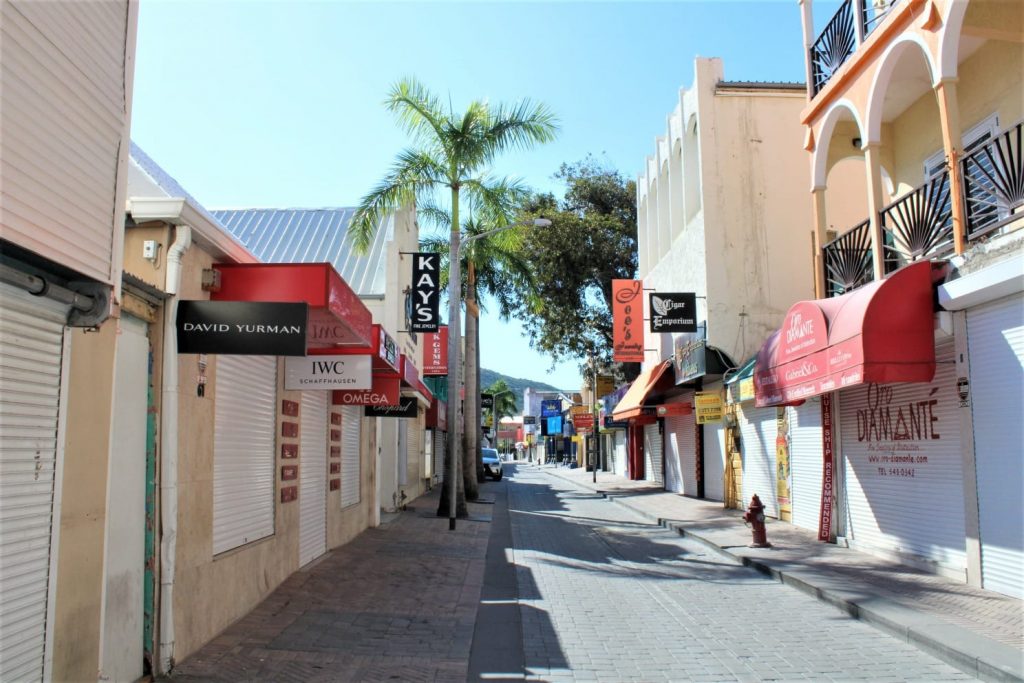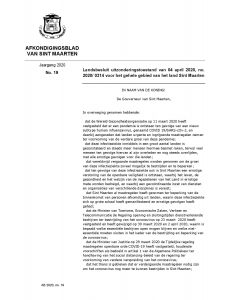State of emergency: island on 24/7 lockdown

PHILIPSBURG – Prime Minister Silveria Jacobs declared the state of emergency for St. Maarten on Saturday. The measure goes into force on Sunday, April 5, for a period of two weeks. Nobody will be allowed to be on the road, or even near a public road. Supermarkets are closed and religious gatherings are prohibited.
 The state of emergency is regulated in the relevant national ordinance (Landsverordening uitzonderingstoestand). Jacobs said at a press conference on Saturday that there will be a 24/7 curfew. The measure can be extended when it ends on April 19 if necessary.
The state of emergency is regulated in the relevant national ordinance (Landsverordening uitzonderingstoestand). Jacobs said at a press conference on Saturday that there will be a 24/7 curfew. The measure can be extended when it ends on April 19 if necessary.
The state of emergency gives the competent authority far-reaching tools for enforcement that infringe for instance on people’s rights to privacy.
The curfew does not apply to the governor, ministers and members of parliament, those working for essential businesses, those who urgently need to visit a hospital or pharmacy and those tasked with the care for an elderly family member; all with the understanding that being on the road (visiting the hospital or that elderly family member) is absolutely necessary.
Not everybody is happy with the measure. During the press conference, Facebook-watchers commented freely. Peter Gunn took the opportunity to call Prime Minister Jacobs “a school teacher dictator.”
Under the state of emergency permits will not be granted for parades on public roads, entertainment events or practicing religion. However, the article banning religious gatherings states that it is prohibited “individually or together with others, outside of buildings and enclosed places.” It is unclear whether this allows for religious gatherings within church buildings or within closed places (though given the 24/7 curfew it seems to be a moot point).
 The state of emergency gives police officers, members of the National Detectives Agency, customs officers and extraordinary police officers the authority to demand information and require the inspection of documents. They are also entitled to enter any place (including private homes) and to conduct house searches.
The state of emergency gives police officers, members of the National Detectives Agency, customs officers and extraordinary police officers the authority to demand information and require the inspection of documents. They are also entitled to enter any place (including private homes) and to conduct house searches.
The minister of justice is authorized to use and even to requisition real estate.
Citizens who do not obey the instructions issued by the competent authority for the execution of the state of emergency measures can be taken to a dedicated place and be held there temporarily.
Companies, organizations and private citizens are prohibited from offering their services.
In an addendum to the decree, the government specifies which businesses have to remain closed and which are allowed to remain partially open. The closure-order applies to grocery stores, bakeries, hardware and electronic stores, notaries, medical laboratory services, medical practitioners and dental and veterinary clinics. They must however all remain available in case of emergencies.
 The government furthermore ordered the shutdown of all construction projects, with the exception of the COVID-19-related construction at the St. Maarten Medical Center.
The government furthermore ordered the shutdown of all construction projects, with the exception of the COVID-19-related construction at the St. Maarten Medical Center.
Some companies must remain closed but they are allowed to provide services to emergency and essential services on the condition that these services are arranged in advance. These companies include restaurants, commercial laundry services, and maintenance and repair services. The latter category refers specifically to garages, tire repair services, plumbing and electrical services and air-conditioning services.
The Sol gas stations in Sucker Garden and on Bush Road remain open but only to supply fuel to vehicles used for essential and emergency services.
Suppliers of cooking gas are only allowed to provide emergency delivery services.
 The addendum contains a list of ten types of companies and organizations that are allowed to remain open. They are: medical emergency and paramedic services; pharmacies; hotels and guesthouses, yachting agencies and marinas that still have clients requiring service; security companies; media outlets; garbage collection; essential government services (for emergencies only); remote technical customer support (TelEm, UTS, GEBE); freight services; and shipping and cargo companies, including DHL and FedEx for the emergency delivery of medical and pharmaceutical supplies.
The addendum contains a list of ten types of companies and organizations that are allowed to remain open. They are: medical emergency and paramedic services; pharmacies; hotels and guesthouses, yachting agencies and marinas that still have clients requiring service; security companies; media outlets; garbage collection; essential government services (for emergencies only); remote technical customer support (TelEm, UTS, GEBE); freight services; and shipping and cargo companies, including DHL and FedEx for the emergency delivery of medical and pharmaceutical supplies.
Those who are allowed to be on the road under the conditions stipulated in the state of emergency decree must have a valid disaster pass or a waiver based on a letter from a business that is signed by Chief Commissioner of police Carl John.
Recording press briefing Prime Minister/Chair EOC about State of Emergency
###
Related links:
National Decree State of Emergency
National Ordinance Regulating State of Emergency


























